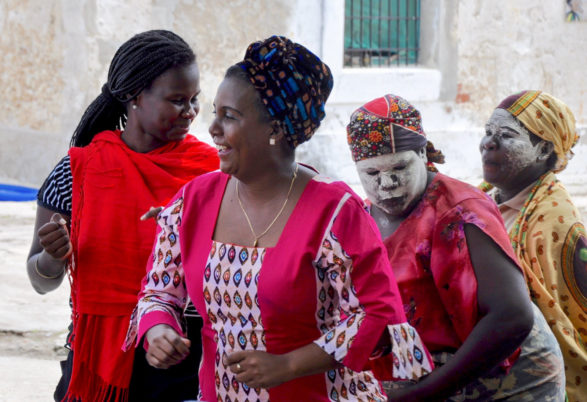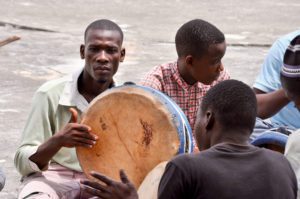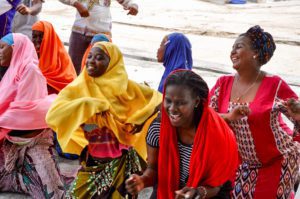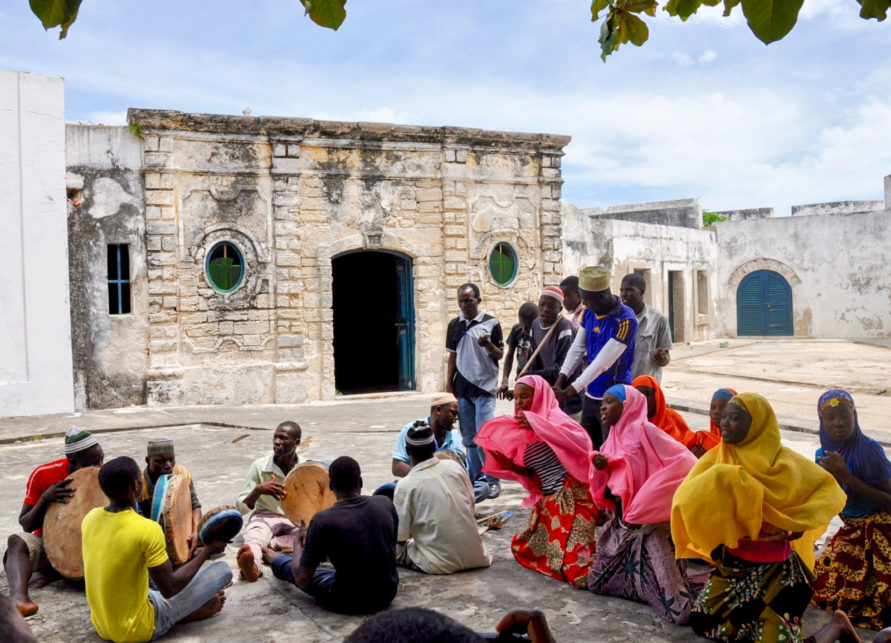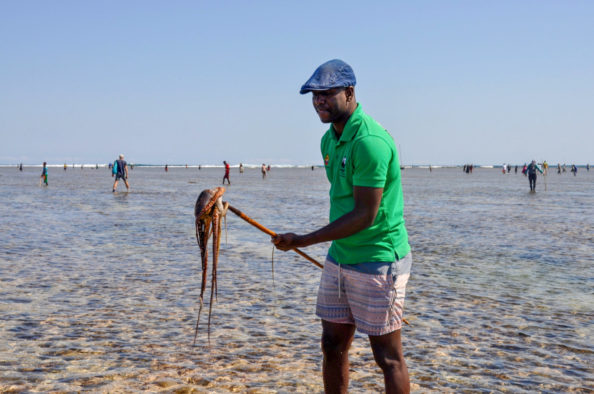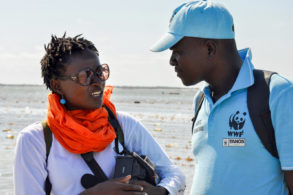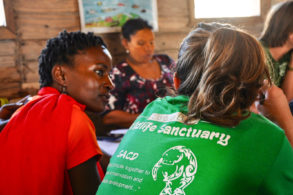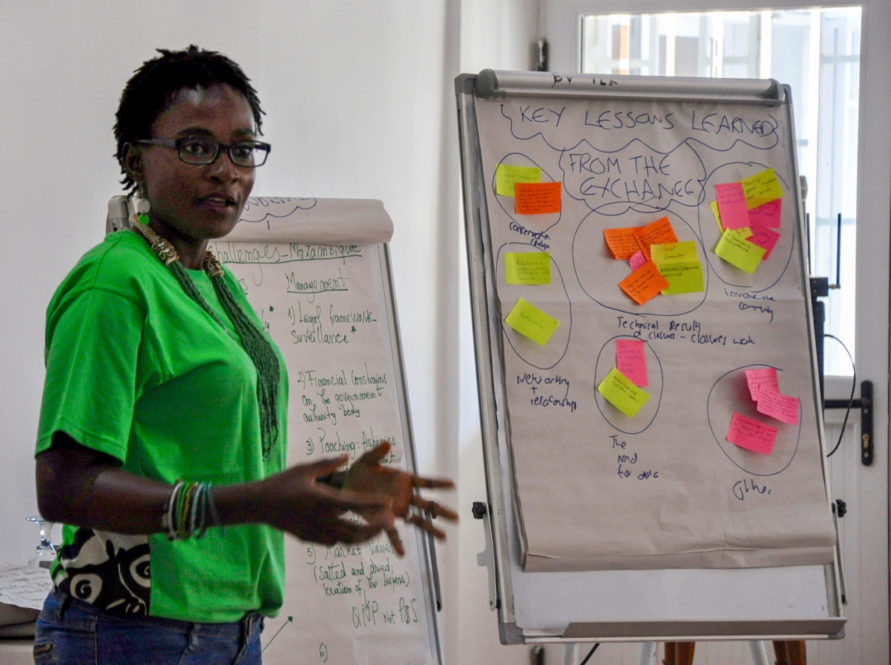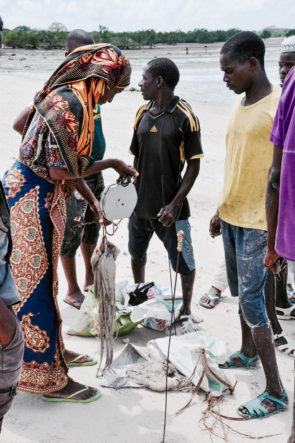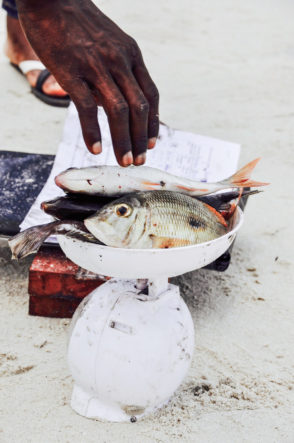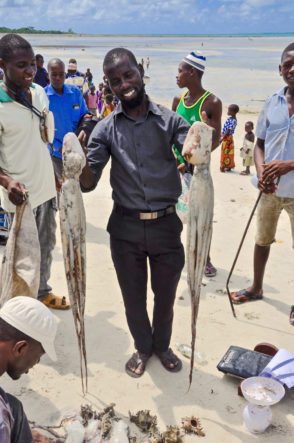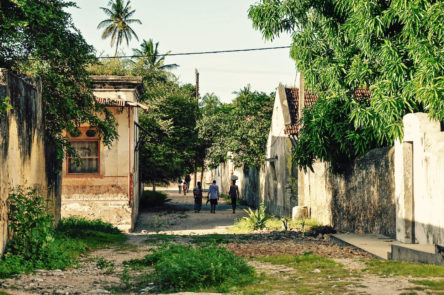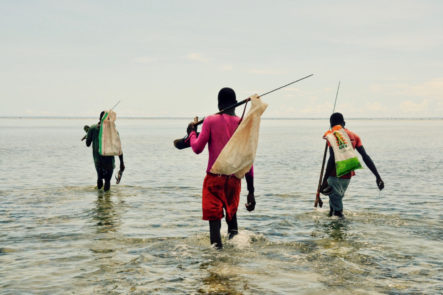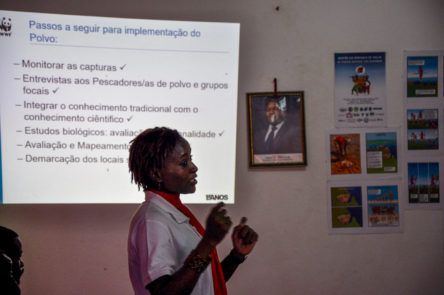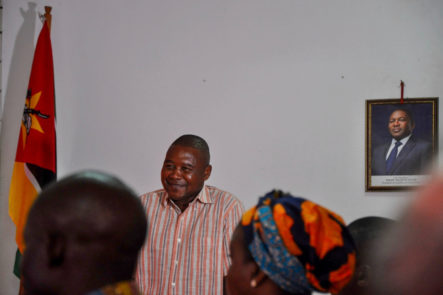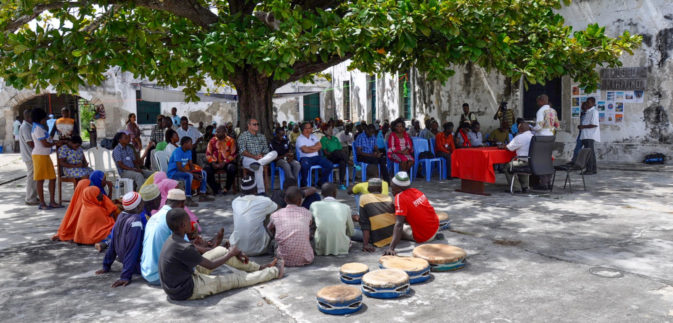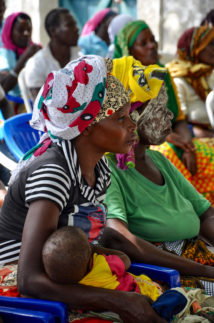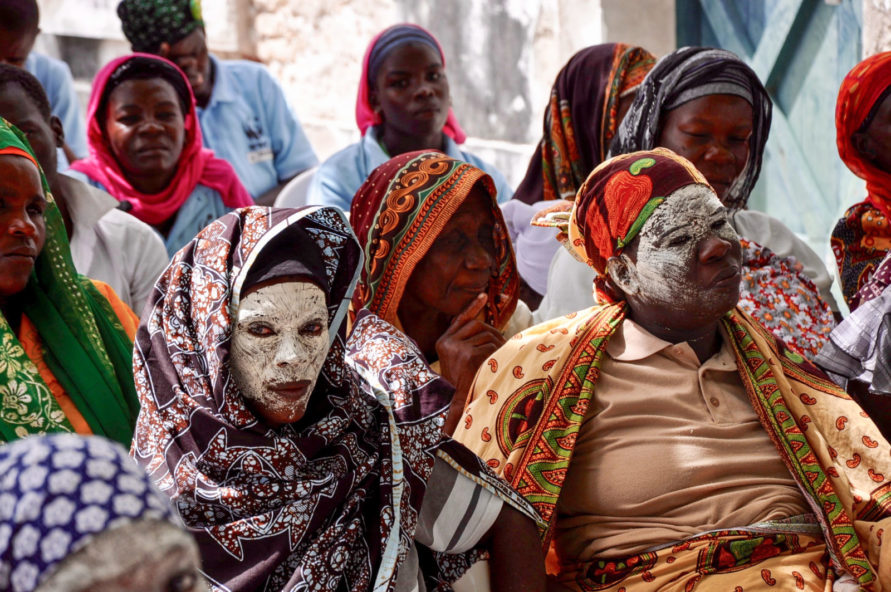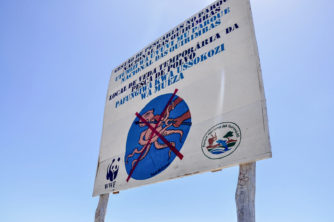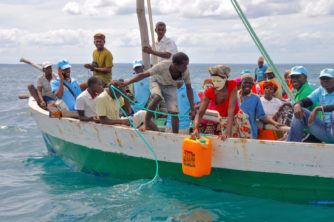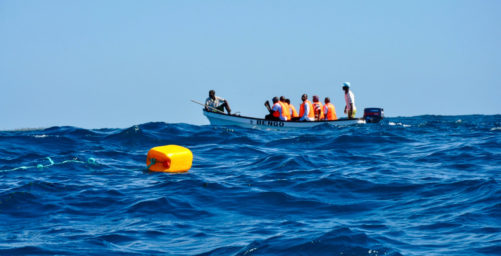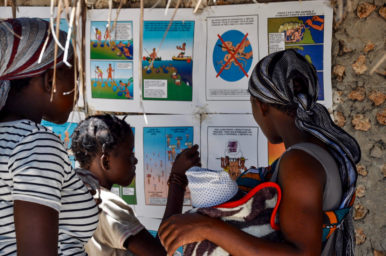What could be more symbolic of an integrated approach to temporary octopus closures than fisherwomen, representatives of local government and the provincial Fisheries Directors dancing together to a song about locally-led fisheries management? During the recent ceremonial inauguration of two octopus temporary closures in northern Mozambique’s Quirimbas National Park I watched how a cultural group’s music performance spontaneously inspired ladies from the different stakeholder groups to get up on their feet and join the fun!
International perspectives and regional experiences
In August 2016, following an invitation from Blue Ventures, staff from WWF Mozambique and Abdala Moto, a member of a fishing community in the Quirimbas archipelago, travelled across the Mozambique channel with me to join our learning exchange to Madagascar. Here, they witnessed the opening of a short-term octopus fisheries closure, and were impressed to see the increased catches and incomes for local fishers thanks to the fast growing nature of octopus.
I remember that during the final workshop that rounded off the exchange trip the Mozambique team had identified some challenges for the establishment of closures in Quirimbas archipelago: a high dependence on exclusively marine resources of the islanders, past experiences with an unsuccessful temporary closure, poaching by migrant fishers who may have less interest in the long term benefits of periodic closures, and the market value of octopus that in lack of a cold chain in this part of the country is sold on to the mainland salted and dried.
I’m very satisfied for having had this opportunity to learn about octopus closures, reproduction and benefits that we can have. It was a life changing experience, not only for me but also for the entire fisheries communities in Quirimbas National Park. It is certain that the octopus closures will be part of our culture.
– Abdala Moto speaking about the Madagascar exchange experience.
Abdala is the president of the local fisheries council on Ibo island, one of the three target islands in Quirimbas archipelago, and he has been enthusiastically communicating what he has learned from the success with periodic octopus closures he observed in Velondriake. But nothing can compete with authentic first hand experience. Luckily, the communities from Quirimbas archipelago got the opportunity to visit Quiwia, a fishing village located close to the cape that is the namesake for the entire province: Cabo Delgado.
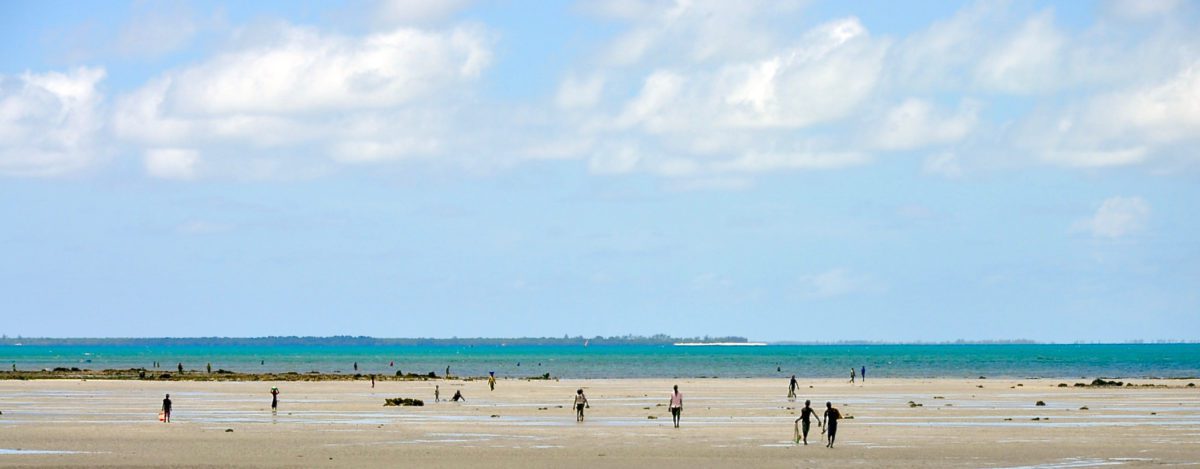
First ever opening day in Quiwia, with Cabo Delgado in the background
For over a year Quiwia’s community has been holding periodic octopus closures with the support of the Our Sea Our Life project, in which I have been helping to set up community-based fisheries monitoring as Blue Ventures’ Mobile Monitoring Coordinator. Quiwia’s success in community-led fisheries management was in turn kick-started by an exchange to Madagascar.
Community exchanges work
We have learned on countless occasions that community exchanges can be one of the most effective ways to spark and spread new ideas. Yet again the direct interaction between fishers worked its magic as the community of Quiwia generously shared their experience with the visitors from another corner of the province. In this way the community members from Quirimbas archipelago took home an appetite to give temporary fisheries closures another chance despite the recognised challenges.
On opening day the equivalent of a normal 15-day fishing period had been landed in a single dayThe Quirimbas archipelago communities have learnt a lot from the exchange visits to sites who have already been implementing temporary octopus closures. First and foremost, an obvious and contagious enthusiasm for managing their marine resources by regulating fishing pressure over time. It doesn’t require an economist to explain the benefits temporary closures can bring when the community of Quiwia is talking about their first opening, that was crowned with a very tangible result: on opening day the equivalent of a normal 15-day fishing period had been landed in a single day.
However – equally important for a successful replication – they have also identified challenges and heard about lessons the host communities have learnt from their experience. During a final meeting before the temporary octopus closure in Quirimbas archipelago was initiated, these challenges were discussed, facilitating an exchange of thoughts between community leaders, the national park authorities, and local government representatives. Addressed were, amongst others, important straight-forward topics such as how to ensure everybody equally respects the rules. But, stimulated by the insight into other communities’ temporary closures experiences, I was impressed to see fishers already thinking ahead on how to prepare the market for the prospective big catch quantities on opening day, from the need for additional salt for drying the catch to creating market links as far as the district capital Pemba.
How can we protect the biodiversity? How can we protect what we have, what’s ours? It’s our responsibility! Our responsibility as communities, as Community Fisheries Councils, as members of the government. It’s everybody’s responsibility to protect what’s ours!
– Albino Nhusse, Administrator of Quirimbas National Park

Fort São João Baptista
The closure ceremonies
Finally, the closures were publically announced in an official ceremony inside Ibo’s Fort of São João Baptista.
To engage the crowd an official public speaker in Mozambique will usually start their speech with some keywords on the topic, followed by “oyé”, and the audience will answer with an energetic “oyé” call:
Ibo oyé! – OYÉ! Fishers oyé! – OYÉ! Mozambican women oyé! – OYÉ! Octopus oyé! – OYÉ! Temporary closures oyé! – OYÉ! Respecting the rules and helping also the migrant fishers to understand the benefits of the closure oyé! – OYÉ! Reaping the benefits of a temporary octopus closure in the form of huge catches on opening day oyé! – OYÉ!
The audience was mostly made up of fisherwomen and fishermen from Ibo and the neighbouring Matemo island, plus a few tourism operators and conservation NGOs. My favourite item on the day’s agenda was a cultural group that had prepared songs on the topic, to break up the obligatory series of speeches given. It was while they were singing about good fishing practices and the concept of temporary fisheries closures, written specifically for this occasion, when suddenly I saw ladies from the different stakeholder groups – government, fisherwomen and Fisheries Direction – join the dancing in a vigorous wave of zest.
After the ceremony, I was lucky enough to join the boats carrying a delegation of each stakeholder group who went out to demarcate the reef Baixo São Gonçalo that the communities had chosen for the pilot closure. On the next day, the whole party travelled to the neighbouring island of Quirimba, to repeat the inauguration ceremony and the demarcation process of Tchamba reef.
In September, both temporary closure sites will open again and the neighbouring communities will see the fruits of their patience. If all goes well and the closure yields the anticipated increased catches we hope the Community Fisheries Councils involved will decide to make periodic closures a long term regular routine. It may also inspire more communities in the area to follow this model. WWF are certainly planning to facilitate community exchanges between Quirimbas and Primeiras & Segundas National Park, another focal site of their marine programme in Mozambique.
We are looking forward to continue strengthening the reciprocal learning relationship between WWF Mozambique and Blue Ventures. Together we are working towards effective community-led conservation initiatives in Mozambique, and thereby contributing to the broader success of the locally-managed temporary octopus closures model in the Western Indian Ocean region.
Find out more about the first periodic reef fishery closure in Quiwia.
All photos in this blog were taken by Anouk Neuhaus.


